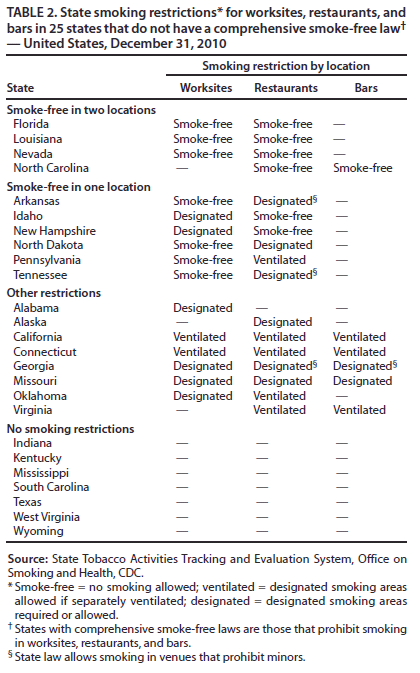April 21st, 2011
CDC: Half the U.S. Now Protected by Comprehensive Smoke-Free Laws
Larry Husten, PHD
According to a CDC analysis in MMWR, nearly half the U.S. population is now protected from second-hand smoke by comprehensive laws that restrict smoking in three venues (private sector worksites, restaurants, and bars). If the current trend continues, all 50 states and the District of Columbia will be smoke-free by 2020.
The first [statewide] law prohibiting indoor smoking was passed in Delaware in 2002. Today, 26 states in the country have comprehensive smoke-free laws. In addition, 10 states have laws that restrict smoking in one or two (but not all three) venues, and eight states have less restrictive laws allowing smoking in designated areas or areas with separate ventilation. Seven states have no smoking restrictions. The south has lagged behind the rest of the country in enacting smoke-free laws.
“The progress made during the past decade in enacting comprehensive state smoke-free laws is an extraordinary public-health achievement,” write the CDC authors.
“Secondhand smoke is responsible for 46,000 heart disease deaths and 3,400 lung cancer deaths among nonsmokers each year,” said the CDC’s Ursula Bauer, director of the CDC’s National Center for Chronic Disease Prevention and Health Promotion, in a press release. “Completely prohibiting smoking in all public places and workplaces is the only way to fully protect nonsmokers from secondhand smoke exposure.”


Oops–My city’s 1990 law was the world’s first to include all these venues–(Others earlier had exempted bars).
San Luis Obispo,CA
Bad info here in several other instances.
Competing interests pertaining specifically to this post, comment, or both:
I co-wrote the 1990 law–way before the 2002 Delaware law noted by Dr. Husten.
Please correct–thanks.
Dr. Hansen, the CDC report focuses on statewide legislation, but you should be congratulated for your pioneering work. We’ve come a long way.